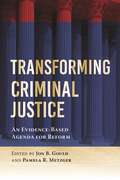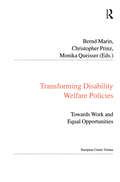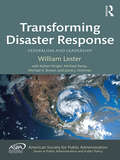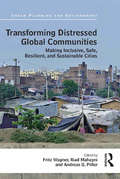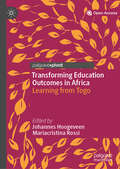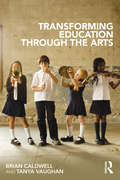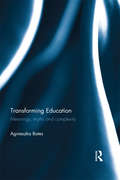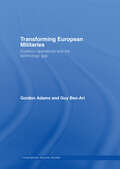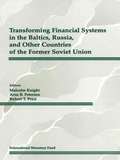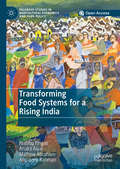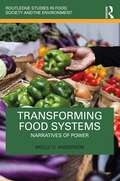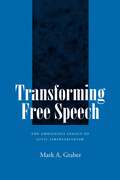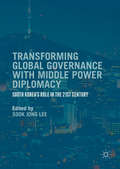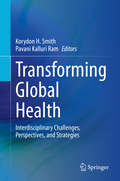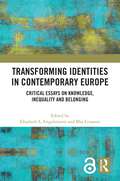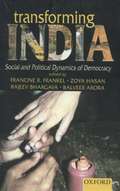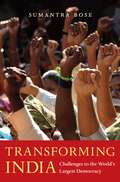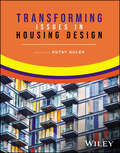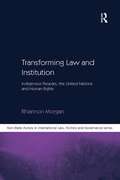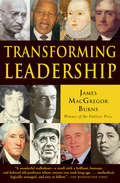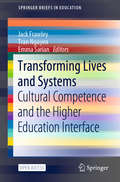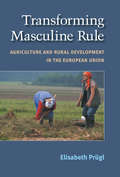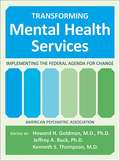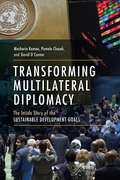- Table View
- List View
Transforming Criminal Justice: An Evidence-Based Agenda for Reform
by Jon B. Gould Pamela R. MetzgerAn evidence-based roadmap for how the American criminal justice system can be reformedThis important volume brings together today's leading criminal justice scholars and practitioners to offer a roadmap for those who want to change the face of the American criminal justice system. This collection of essays addresses thirteen significant issues in justice reform, starting from a suspect’s first interaction with the police and continuing to gun violence, prosecutorial innovation, sentencing reform, eliminating bail, recidivism and re-entry, collateral consequences of crime, and eliminating false convictions. A common theme emerges in this volume: the American criminal justice system is riddled with weaknesses that cause harm and require greater accountability. Each chapter is both educational and prescriptive, helping readers to understand the problems that plague the criminal justice system, how those problems can be addressed, and who should take responsibility for them. Part scholarly research, part account of the justice system’s workings and failings, and part agenda for action, Transforming Criminal Justice aims to educate and move readers to effect change.
Transforming Disability Welfare Policies: Towards Work and Equal Opportunities (Public Policy and Social Welfare)
by Christopher PrinzBringing together contributions from institutions such as the OECD, the WHO, the World Bank and the European Disability Forum, as well as policy makers and researchers, this volume focuses on disability and work. The contributors address a wide range of issues including what it means to be disabled, what rights and responsibilities society has for people with disabilities, how disability benefits should be structured, and what role employers should play. Fundamental reading for specialists in disability, social protection and public economics, and for social policy academics, researchers and students generally, Transforming Disability Welfare Policies makes an enormous contribution to the literature.
Transforming Disaster Response: Federalism and Leadership (ASPA Series in Public Administration and Public Policy)
by William LesterMuch of the published work on disaster response has focused on specific disasters, highlighting what went wrong. Taking a new approach, this book explores ways in which transformational leadership principles may be applied to an organization’s disaster preparation and response, moving the organization away from a competitive or top-down approach and toward a more collaborative one. Rather than focus on centralizing responsibility, with commands emanating from the top, author William Lester offers readers a new paradigm, with step by step instructions on placing transformative and collaborative systems front and center, in order to develop a sustainable disaster response system – one that is not centered on a specific leader or time, but instead focuses on the changes needed to build a system that can outlive any one leader. Implementation plans to move from concept into workable, effective strategies that can be used immediately are included. Assuming no prior background in either organizational theory or disaster response systems, the book offers practical examples and hands-on explorations of the responses to Hurricanes Sandy, Harvey, Irma, and Maria, written by experts who know those disasters best – delivering important insight into what elements make the best disaster response system.
Transforming Distressed Global Communities: Making Inclusive, Safe, Resilient, and Sustainable Cities (Urban Planning and Environment)
by Fritz Wagner Riad Mahayni Andreas PillerMany of our global cities are distressed and facing a host of issues: economic collapse in the face of rising expectations, social disintegration and civil unrest, and ecological degradation and the threats associated with climate change, including more frequent and more severe natural disasters. Our long-held assumptions about man and nature and how they interact are defunct. We realize now that we can no longer continue to build without addressing the long-term impacts of our actions and their spillovers. Energy and natural resources are finite. The way we configure economies has come into question. In the developed world, especially in the United States, infrastructure and the notions that underpin it are outdated. Meanwhile, the developing world is experiencing major, rapid transformations in lifestyles and economies that are affecting billions of people and requiring a whole new way of planning human settlements. Cities are the key to our future; they represent the most effective vehicle for positive advancements in the human condition and environmental change. This volume argues for the need to redesign and re-plan our cities in holistic ways that reflect our new understanding and relate to their diversity and multi-dimensionality. Presenting a range of case studies from around the world, this volume examines how these distressed cities are dealing with these issues in planning for their future. Alongside these empirical chapters are philosophical essays that consider the future of distressed cities. Bringing together a team of leading scholars, United Nations agencies, non-governmental organizations, private consulting firms, international organizations and foundations, and policy officials, this volume provides a unique and comprehensive overview on how to transform distressed communities into more livable places.
Transforming Education Outcomes in Africa: Learning from Togo
by Mariacristina Rossi Johannes HoogeveenGood education changes lives. It is therefore unsurprising that improved schooling plays a central part in most development strategies. At the same time, the expansion of school attainment alone is not sufficient to guarantee improved welfare. This book focuses on one country in West Africa, Togo, to explore what a country that has successfully increased enrollment rates can do to enhance learning outcomes. The authors explore different avenues for improvement, including enhancing the efficiency with which resources are used; increasing the qualifications of teachers; and through greater community involvement in school management. There is scope for improvement along all these dimensions, yet changes at the margin are insufficient to bring about the transformation needed to bring about acceptable levels of learning.Important reading for anyone interested in understanding the pathways to improving the education system in Togo and other developing countries.
Transforming Education through the Arts
by Brian Caldwell Tanya VaughanThis timely book takes up the challenge of maintaining programs in the arts in the face of unrelenting pressure from two directions; the increasing focus on literacy and numeracy in schools, teamed with the cut-backs in public funding that often affect the arts most severely. Drawing on the wealth of evidence already available on the impact of the
Transforming Education: Meanings, myths and complexity
by Agnieszka BatesTransforming Education challenges the current global orthodoxy that ‘educational transformation’ can be achieved through a step-by-step implementation of centralised, performance-based strategies for school improvement. Complex responsive processes theory is utilised in an original way to critique leadership myths and explore the alternative, deeper meanings of educational transformation. The theory opens up new forms of understanding about how ordinary practitioners negotiate the meanings of ‘improvement’ in their everyday practice. It is in the gap between the emergence of these local interactions and the predetermined designs of policy-makers that educational transformation can be lost or found. This book is an essential read for education professionals and students interested in the fields of complexity, education policy, leadership and management.
Transforming European Militaries: Coalition Operations and the Technology Gap (Contemporary Security Studies)
by Gordon Adams Guy Ben-AriA unique look at European Network Enabled Capabilities (NEC) and their implications for transatlantic co-operation in future operations. Gordon Adams and Guy Ben-Ari identify the key requirements for improvement of Europe’s abilities as an international actor. They focus on national and collaborative, as well as existing and planned, networks. They clearly show the reader how, with the removal of the risks of Soviet invasion, European defence planners must now modify their strategies and capabilities to address new threats, both at home and overseas. They also show why future operations within international coalitions will require network-based capabilities that can interoperate. Europe possesses a technological and industrial base adequate to supply such capabilities, and its defence strategies are gradually being modified to emphasize expeditionary forces operations within coalition settings. However, much remains to be done. This volume tackles the key challenges facing European nations who need to operate alongside each other and with their North American allies more effectively and efficiently. This book will be of great interest to all students of European affairs and politics, international relations and military and strategic studies.
Transforming Financial Systems in the Baltics, Russia, and Other Countries of the Former Soviet Union
by Malcolm Knight Arne B. Petersen Robert T. PriceA report from the International Monetary Fund.
Transforming Food Environments
by Charlotte E.L. EvansWe regularly find ourselves in food environments that promote the consumption of high fat and sugary foods rather than encouraging us to eat more fruit and vegetables. However, because of increased media attention, people are becoming more interested in alternative approaches to improving the many food-related decisions we make daily. Transforming Food Environments features evidence from several disciplines exploring initiatives that have improved food environments and discusses the importance of achieving success in equitable and sustainable ways. The book presents information on diverse food environments followed by methods that help readers become aware of the design of interventions and food policies. It covers food environments in schools, workplaces, and community centres as well as fast food establishments and food marketing. The book presents methods to help encourage better food choices and purchase of healthier foods. It explores persuasion tactics used by health professionals such as changing availability and/or price, using nudging techniques, and food labelling. Led by Editor Charlotte Evans, Associate Professor of Nutritional Epidemiology and Public Health Nutrition at the University of Leeds; and written by an international range of authors from countries including the US, Canada, Australia, New Zealand, Japan and the United Kingdom, this multidisciplinary book appeals to students, researchers, public health professionals and policy makers. It also raises awareness and provides a comprehensive treatment of the importance of our environments on food choice.
Transforming Food Systems for a Rising India (Palgrave Studies in Agricultural Economics and Food Policy)
by Prabhu Pingali Anaka Aiyar Mathew Abraham Andaleeb RahmanThis open access book examines the interactions between India’s economic development, agricultural production, and nutrition through the lens of a “Food Systems Approach (FSA).” The Indian growth story is a paradoxical one. Despite economic progress over the past two decades, regional inequality, food insecurity and malnutrition problems persist. Simultaneously, recent trends in obesity along with micro-nutrient deficiency portend to a future public health crisis. This book explores various challenges and opportunities to achieve a nutrition-secure future through diversified production systems, improved health and hygiene environment and greater individual capability to access a balanced diet contributing to an increase in overall productivity. The authors bring together the latest data and scientific evidence from the country to map out the current state of food systems and nutrition outcomes. They place India within the context of other developing country experiences and highlight India’s status as an outlier in terms of the persistence of high levels of stunting while following global trends in obesity. This book discusses the policy and institutional interventions needed for promoting a nutrition-sensitive food system and the multi-sectoral strategies needed for simultaneously addressing the triple burden of malnutrition in India.
Transforming Food Systems: Narratives of Power (Routledge Studies in Food, Society and the Environment)
by Molly D. AndersonThis book focuses on the contested nature and competing narratives of food system transformations, despite it being widely acknowledged that changes are essential for the safeguarding of human and planetary health and well-being.The book approaches food system transformation through narratives, or the stories we tell ourselves and others about how things work. Narratives are closely connected with theories of change, although food system actors frequently lack explicit theories of change. Using political economy and systems approaches to analyze food system transformation, the author focuses on how power in food systems manifests, and how this affects whom can obtain healthy and culturally appropriate food on a reliable basis. Among the narratives covered are agroecology, food sovereignty and technological innovation. The book draws on interviews and recorded speeches by a broad range of stakeholders, including international policymakers, philanthropists, academics and researchers, workers in the food and agricultural industries and activists working for NGOs and social movements. In doing so, it presents contrasting narratives and their implicit or explicit theories of change. This approach is vitally important as decisions made by policymakers over the next few years, based on competing narratives, will have a major influence on who will eat what, how food will be produced, and who will have a voice is shaping food systems. The overarching contribution of this book is to point toward the most promising pathways for achieving sustainable food systems and refute pathways that show little hope of achieving a more sustainable future.This book will be of great interest to students, scholars and policymakers interested in creating a sustainable food system which will ensure a food secure, socially just and environmentally sustainable future.
Transforming Free Speech: The Ambiguous Legacy of Civil Libertarianism
by Mark A. GraberContemporary civil libertarians claim that their works preserve a worthy American tradition of defending free-speech rights dating back to the framing of the First Amendment. Transforming Free Speech challenges the worthiness, and indeed the very existence of one uninterrupted libertarian tradition.Mark A. Graber asserts that in the past, broader political visions inspired libertarian interpretations of the First Amendment. In reexamining the philosophical and jurisprudential foundations of the defense of expression rights from the Civil War to the present, he exposes the monolithic free-speech tradition as a myth. Instead of one conception of the system of free expression, two emerge: the conservative libertarian tradition that dominated discourse from the Civil War until World War I, and the civil libertarian tradition that dominates later twentieth-century argument.The essence of the current perception of the American free-speech tradition derives from the writings of Zechariah Chafee, Jr. (1885-1957), the progressive jurist most responsible for the modern interpretation of the First Amendment. His interpretation, however, deliberately obscured earlier libertarian arguments linking liberty of speech with liberty of property. Moreover, Chafee stunted the development of a more radical interpretation of expression rights that would give citizens the resources and independence necessary for the effective exercise of free speech. Instead, Chafee maintained that the right to political and social commentary could be protected independent of material inequalities that might restrict access to the marketplace of ideas. His influence enfeebled expression rights in a world where their exercise depends increasingly on economic power.Untangling the libertarian legacy, Graber points out the disjunction in the libertarian tradition to show that free-speech rights, having once been transformed, can be transformed again. Well-conceived and original in perspective, Transforming Free Speech will interest political theorists, students of government, and anyone interested in the origins of the free-speech tradition in the United States.
Transforming Global Governance with Middle Power Diplomacy
by Sook Jong LeeThis book examines South Korea's recent strategic turn to middle power diplomacy, evaluating its performance so far in key areas of security, maritime governance, trade, finance, development assistance, climate change, and cyber space. In particular, the authors pay special attention to how South Korea's middle power diplomacy can contribute to making the U. S. -China competition in East Asia benefit Korea. The contributors discuss the opportunities and limits of this middle power diplomacy role, exploring how Korea can serve as a middleman in Sino-Japanese relations, rather than as a US ally against China; use its rich trade networks to negotiate beneficial free trade agreements; and embracing its role as a leader in climate change policy, along with other topics. This book is a must read for foreign policy officials and experts who engage in the Asia-Pacific region, rekindling the academic study of middle powers whose influence is only augmenting in our increasingly networked twenty-first century world.
Transforming Global Health: Interdisciplinary Challenges, Perspectives, and Strategies
by Korydon H. Smith Pavani Kalluri RamThis contributed volume motivates and educates across fields about the major challenges in global health and the interdisciplinary strategies for solving them. Once the purview of public health, medicine, and nursing, global health is now an interdisciplinary endeavor that relies on expertise from anthropology to urban planning, economics to political science, geography to engineering. Scholars and practitioners in the health sciences are seeking knowledge from a wider array of fields while, simultaneously, students across majors have a growing interest in humanitarian issues and are pursuing knowledge and skills for impacting well-being across geographic and disciplinary borders. Using a highly practical approach and illustrative case studies, each chapter of this edited volume frames a particular problem and illustrates how interdisciplinary problem-solving can address the greatest challenges in global health today. In doing so, each chapter spurs critical and creative thinking about emergent and future problems. Topics explored among the chapters include: Transforming health and well-being for refugees and their communitiesGoverning to deliver safe and affordable water The global crisis of antimicrobial resistanceLow-tech, high-impact interventions to prevent neonatal mortalityCommunicating taboo health subjectsAlternative housing delivery for slum upgrades Transforming Global Health: Interdisciplinary Challenges, Perspectives, and Strategies is a vital and timely compendium for any reader invested in improving global health equity. It will find an audience with researchers, practitioners, policymakers, and program implementers, as well as undergraduate and graduate students and faculty in the fields of global health, public health, and the health sciences.
Transforming Identities in Contemporary Europe: Critical Essays on Knowledge, Inequality and Belonging
by Elisabeth L. EngebretsenInterdisciplinary in perspective, this book explores contemporary struggles around ‘identity politics’ in Europe, offering a unique glimpse into contemporary tensions and paradoxes surrounding identities, belonging, exclusions and their deep-seated gendered, colonial and racist legacies. With a particular focus on the Nordic region, it provides insights into the ways in which people who find themselves in minoritized positions struggle against multiple injustices. Through a series of case studies documenting counter-struggles against racist, colonialist, sexist forms of discrimination and exclusion, Transforming Identities in Contemporary Europe asks how the paradigm and politics of the welfare state operate to discriminate against the most marginalized, by instating a naturalized hierarchy of human-ness. As such it will appeal to scholars across the social sciences and humanities with interests in race, gender, colonialism and postcolonialism, citizenship and belonging.
Transforming India
by Zoya Hasan Francine R. Trankel Rajeev Bhargava Balveer AroraThis volume provides a cross-disciplinary analysis by leading Indian social scientists of the transformations unleashed by the introduction of egalitarian and liberal principles of government within the context of the colonial legacy, hierarchical social order, group-based identities, and plural cultures.
Transforming India
by Sumantra BoseA nation of 1. 25 billion people composed of numerous ethnic, linguistic, religious, and caste communities, India is the worlds most diverse democracy. Drawing on his extensive fieldwork and experience of Indian politics, Sumantra Bose tells the story of democracys evolution in India since the 1950s--and describes the many challenges it faces in the early twenty-first century. Over the past two decades, India has changed from a country dominated by a single nationwide party into a robust multiparty and federal union, as regional parties and leaders have risen and flourished in many of Indias twenty-eight states. The regionalization of the nations political landscape has decentralized power, given communities a distinct voice, and deepened Indias democracy, Bose finds, but the new era has also brought fresh dilemmas. The dynamism of Indias democracy derives from the active participation of the people--the "demos. " But as Bose makes clear, its transformation into a polity of, by, and for the people depends on tackling great problems of poverty, inequality, and oppression. This tension helps explain why Maoist revolutionaries wage war on the republic, and why people in the Kashmir Valley feel they are not full citizens. As India dramatically emerges on the global stage, "Transforming India: Challenges to the Worlds Largest Democracy "provides invaluable analysis of its complexity and distinctiveness.
Transforming Issues in Housing Design
by Kutay GulerTRANSFORMING ISSUES IN HOUSING DESIGN A practical and complete resource for students, researchers, and practitioners of housing design Transforming Issues in Housing Design delivers a comprehensive vision for the design, philosophy, psychology, efficiency, and constitution of housing. This collection of articles explores many of the most pressing and relevant issues related to the ongoing transformation of housing design. Twenty-two contributed chapters discuss the past and current state of housing design, how it evolved to become what it is today, and, finally, how it may unfold in the future. A team of global experts presents the most up-to-date research and a diverse and illuminating collection of examples to highlight housing design around the world. Readers will also find: A thorough introduction to modern housing design and how it relieves and contributes to various social and economic problems Insightful explorations of the built environment, interior architecture, urban design, sustainable living, space planning, and more Practical discussions of a theoretical framework to make sense of housing design concepts Complete treatments of concepts, research, and built projects from a diverse range of communities and cultures Perfect for architects and students of urban studies, interior design, and architecture, Transforming Issues in Housing Design will also benefit those who design, research, and teach housing.
Transforming Law and Institution: Indigenous Peoples, the United Nations and Human Rights (Non-State Actors in International Law, Politics and Governance Series)
by Rhiannon MorganIn the past thirty or so years, discussions of the status and rights of indigenous peoples have come to the forefront of the United Nations human rights agenda. During this period, indigenous peoples have emerged as legitimate subjects of international law with rights to exist as distinct peoples. At the same time, we have witnessed the establishment of a number of UN fora and mechanisms on indigenous issues, including the UN Permanent Forum on Indigenous Issues, all pointing to the importance that the UN has come to place on the promotion and protection of indigenous peoples' rights. Morgan describes, analyses, and evaluates the efforts of the global indigenous movement to engender changes in UN discourse and international law on indigenous peoples' rights and to bring about certain institutional developments reflective of a heightened international concern. By the same token, focusing on the interaction of the global indigenous movement with the UN system, this book examines the reverse influence, that is, the ways in which interacting with the UN system has influenced the claims, tactical repertoires, and organizational structures of the movement.
Transforming Leadership
by James MacGregor BurnsIn Transforming Leadership, Burns illuminates the evolution of leadership structures, from the chieftains of tribal African societies, through Europe's absolute monarchies, to the blossoming of the Enlightenment's ideals of liberty and happiness during the American Revolution. Along the way he looks at key breakthroughs in leadership and the towering leaders who attempted to transform their worlds-Elizabeth I, Washington, Jefferson, Gandhi, Eleanor Roosevelt, Gorbachev, and others. Culminating in a bold and innovative plan to address the greatest global leadership challenge of the twenty-first century, the long-intractable problem of global poverty, Transforming Leadership will arouse discussion and controversy in classrooms and boardrooms throughout the country.
Transforming Lives and Systems: Cultural Competence and the Higher Education Interface (SpringerBriefs in Education)
by Jack Frawley Tran Nguyen Emma SarianThis open access book explores the transformative experiences of participants in the University of Sydney’s National Centre for Cultural Competence (NCCC) programs. The establishment of the NCCC was viewed as a critical point of departure for developing an institution-wide agenda of cultural competence. The NCCC’s work since its inception reflects efforts to lay important foundations for cultural change at the University. With the ultimate aim of establishing cultural competence as an agent for transformational change and social justice education, the NCCC has steadily expanded its research and teaching work both within and beyond the University of Sydney. Further, it has developed foundational resources to support and encourage University staff to integrate cultural competence philosophy and pedagogy in their curricula, teaching and research. This includes the ability to engage meaningfully with the cultures, histories and contemporary issues in Aboriginal and Torres Strait Islander communities. The NCCC programs have been designed to encourage participants to learn about who they are and how they can positively impact the transformational change the University has begun.The book presents participants’ reflections on their experiences at the organisational and personal level. Readers will gain insights into a range of topics including cultural competence, communities of practice, policy implementation, and transformative leadership at the interface between higher education and professional lives.
Transforming Masculine Rule: Agriculture and Rural Development in the European Union
by Elisabeth Prugl"The premise of mainstreaming gender is to bring equality concerns into every aspect of policy-making, and this brave book offers a close look at how feminists have taken up the challenge to transform the hidden dynamics of male domination in agricultural policy in Europe. In contrast to the automatic assumption that (neo)liberal policy always works against women’s interests, Prügl demonstrates the potential for feminist ju-jitsu to take advantage of multiple levels of governance to empower women in some circumstances. Although feminists were not always successful, the story of their efforts to remake agricultural policy should encourage activists to look for points of leverage in this and other contested and changing multilevel power systems. " ---Myra Marx Ferree, University of Wisconsin "Information on policy development, conflicts about improving the status of farm women, and using rural development policies to foster gender equality is hard to access in English and extremely useful for researchers concerned with the specifics of gender equality policy in the EU. " ---Alison Woodward, Institute for European Studies, Vrije Universiteit Brussel "This book is a must-read for scholars interested in the gendered process of global restructuring. Elisabeth Prügl succeeds superbly in teasing out the power politics involved in European agricultural policy. Through the lens of a feminist-constructivist approach, she makes visible the multiple mechanisms of gendered power within the state. This very lucid narrative is a milestone in a new generation of feminist theoretical scholarship. " ---Brigitte Young, University of Muenster, Germany Taking West and East Germany as case studies, Elisabeth Prügl shows how European agricultural policy has cemented long-standing gender-based inequalities and how feminists have used liberalization as an opportunity to challenge such inequalities. Through a comparison of the EU’s rural development program known as LEADER as it played out in the Altmark region in the German East and in the Danube/Bavarian Forest region in the West, Prügl provides a close-up view of the power politics involved in government policies and programs. In identifying mechanisms of power (refusal, co-optation, compromise, normalization, and silencing of difference), Prügl illustrates how these mechanisms operate in arguments over gender relations within the state. Her feminist-constructivist approach to global restructuring as a gendered process brings into view multiple levels of governance and the variety of gender constructions operating in different societies. Ultimately, Prügl offers a new understanding of patriarchy as diverse, contested, and in flux. Jacket photograph: © iStockphoto. com/Wojtek Kryczka
Transforming Mental Health Services: Implementing the Federal Agenda for Change, First Edition
by Howard H. Goldman Jeffrey A. Buck Kenneth S. ThompsonThis compendium of 17 articles addresses the goals set forth by the President's New Freedom Commission on Mental Health in its 2003 report, Achieving the Promise: Transforming Mental Health Care in America. The report represents the first time since the Carter Administration that such a high-level group evaluated U.S. mental health care.
Transforming Multilateral Diplomacy: The Inside Story of the Sustainable Development Goals
by Macharia Kamau Pamela Chasek David O'ConnorTransforming Multilateral Diplomacy provides the inside view of the negotiations that produced the UN Sustainable Development Goals (SDGs). Not only did this process mark a sea change in how the UN conducts multilateral diplomacy, it changed the way the UN does its business. This book tells the story of the people, issues, negotiations, and paradigm shifts that unfolded through the Open Working Group (OWG) on SDGs and the subsequent negotiations on the 2030 Sustainable Development Agenda, from the unique point of view of Ambassador Macharia Kamau, and other key participants from governments, the UN Secretariat, and civil society.
